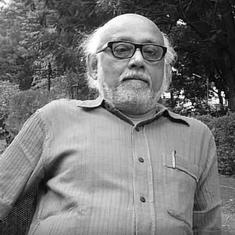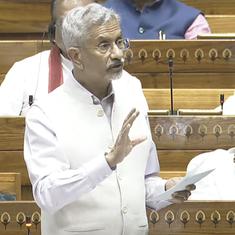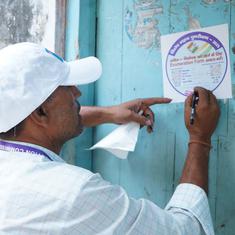The Calcutta High Court has gained notoriety for being the proxy ground for political battles between the Bharatiya Janata Party and the ruling Trinamool Congress in West Bengal.
In March, Justice Abhijit Gangopadhyay, best known for taking on the Trinamool Congress through his judgments in court and even his statements outside it, resigned as a judge. Two days later, he joined the BJP, going on to contest and win the Lok Sabha elections on the party’s ticket.
Last month, a retiring judge of the High Court, Justice Chitta Ranjan Dash, credited the Rashtriya Swayamsevak Sangh – the BJP’s ideological parent – for shaping his personality. He said that he was ready to go back to the Sangh.
While the Lok Sabha election was underway, the court delivered two significant verdicts, cancelling about 25,000 appointments in state-run schools and striking down all Other Backward Classes certificates issued in West Bengal after 2010. The BJP used these verdicts to target the Trinamool Congress.
Against this backdrop comes a fresh controversy involving a sitting judge.
On June 6, a lawyer named Sanjoy Das filed a public interest litigation in the Calcutta High Court, pleading that cases related to police action not be allocated to Justice Amrita Sinha since her husband was being investigated by the West Bengal police in a criminal case since December. The court has yet to issue notice in response to the petition.
One of the lawyers representing the petitioner told Scroll that Das is not raising an accusatory finger against Sinha. “We are just pointing out presumptive bias that exists when Sinha decides on police action cases even as her husband faces police action,” said lawyer Somenath Sanyal.
But the petition has raised eyebrows since it comes close on the heels of Trinamool MP and chief minister Mamata Banerjee’s nephew Abhishek Banerjee accusing Sinha of bias against him. In February, Banerjee had filed a petition before the Supreme Court, requesting for directions that cases involving him not be heard by Sinha.
Sinha has been hearing a clutch of matters in which Trinamool leaders and state government officials stand accused of financial wrongdoing. She has passed stringent orders against them, including one that imposed a fine of Rs 25 lakh on Abhishek Banerjee.
Some lawyers alleged that the criminal investigation against Sinha’s husband was politically motivated in order to harass her. “The government has been trying to pressurise judges and control and threaten the judiciary,” said advocate Mukul Biswas who is based in Kolkata.
Others have argued that the petition seeking police cases not to be placed before Sinha is misplaced since judges do not choose which cases are allocated to them, the chief justice does. “Chief justices of all high courts periodically change the roster for judges,” said advocate Debangan Bhattacharya, who practices at the Calcutta High Court. “If the Chief Justice of the Calcutta High Court wishes to change the roster, he too will”.
However, the bar at Calcutta High Court is itself divided. Last year, a group of lawyers disrupted proceedings in the court of another judge, and even filed a complaint against him, accusing him of delivering biased judgements in favour of the BJP.
In this highly charged context, the debate over Sinha’s record as a judge is playing out in full public glare. This is partly because she is among the few judges in Calcutta High Court who have allowed the proceedings in their courts to be live-streamed. While this has made Sinha quite popular, it has also led to greater public scrutiny of her orders for potential political bias.
Sinha and the TMC
Sinha was a practising advocate before the Calcutta High Court for about two decades before she was invited to join the court as an additional judge in May 2018. She was appointed a permanent judge of the court on April 24, 2020.
Since May 2023, she has been hearing the high-profile teacher recruitment scam case, which has featured allegations of large-scale financial wrongdoing and corruption against the state government and Trinamool leaders in return for appointments to public schools in the state.
She has passed a slew of orders that have gone against the state’s ruling party.
In one of her first orders passed on May 18 last year, Sinha allowed the Central Bureau of Investigation and the Enforcement Directorate to question Trinamool MP Abhishek Banerjee in the case. This is when she fined him Rs 25 lakh for wasting the court’s time by delaying the investigation. The fine was eventually stayed by the Supreme Court.

In September, she censured an Enforcement Directorate official for filing an incomplete report on the assets of those accused in the alleged scam, including Abhishek Banerjee, and removed him from the probe in the case.
In December, she questioned the growth in Abhishek Banerjee’s assets since 2014, when he was first elected as MP.
Later that month, she cancelled the appointment of 94 school teachers who had been appointed in 2014, for being ineligible for the teachers’ eligibility test they had cleared.
In January, she ordered the Enforcement Directorate to collect the voice sample of an accused in the alleged scam. The accused, SK Bhadra, had filed a criminal revision application about his involvement in a case that was lying pending before another judge. A two-judge bench led by Justice Soumen Sen censured Sinha for stepping into a matter that was pending before another judge.
Within days, Gangopadhyay, who was then a judge, noted in an unrelated order that Sen had privately told Sinha to “not disturb” writ petitions related to Banerjee and to stop live-streaming proceedings in her court. Gangopadhyay claimed Sinha had reported this to the chief justice of the High Court, who had relayed this to the chief justice of India.
This rather bizarre turn of events was the culmination of a long-standing conflict between Gangopadhyay and Sen that had been playing out in conflicting orders in at least two different matters relating to alleged impropriety by the government. Based on the stances they had taken in the orders, Gangopadhyay had come to be seen as anti-Trinamool Congress, while Sen was viewed as supportive of the ruling party in the state.
Gangopadhyay’s defence of Sinha was, therefore, held up by party supporters as confirmation of her being part of the anti-Trinamool Congress group in the High Court bench.
In February, Abhishek Banerjee approached the Supreme Court, alleging that Sinha was biased against him and asked for cases against him to be reassigned to another judge. The Supreme Court declined to provide any immediate relief in the petition.
Abhishek Banerjee contended that Gangopadhyay’s order referring to Sen and Sinha raised apprehensions over Sinha conducting proceedings in cases related to Banerjee in a fair and impartial manner. But Chief Justice of India DY Chandrachud asked in court whether Gangopadhyay’s remarks were enough to shift the proceedings from Sinha, as had been pleaded by Abhishek Banerjee.
Many lawyers in the Calcutta High Court, however, say Sinha has been unfairly targeted by the Trinamool Congress. “Just because a judge passes an order that is adversarial to the interests of a political party does not mean that the judge is against that party,” advocate Debangan Bhattacharya said.
He added that the fact that Sinha’s orders “have not been challenged before or changed by a greater bench of the high court or the Supreme Court, means that the orders are legally correct”.
Sinha and the BJP
Sinha has also passed many orders in cases involving the BJP. These have largely gone in favour of the national party.
Last month, she barred the Bengal police from taking coercive action against BJP leader Suvendu Adhikari after firearms and large sums of cash were seized from his house. Adhikari accused the police of planting them.
On June 2, she stayed first information reports filed by the police against two BJP Lok Sabha candidates, both of whom alleged they were being implicated in false cases to prevent them from participating in the counting of votes on June 4.
On June 11, Sinha barred the Bengal police from arresting BJP politician Hiranmay Chattopadhyay without leave of the court. Chattopadhyay had been accused of tampering with a voice recording of Trinamool leader Deepak Adhikari who had contested the Lok Sabha election against him.
Earlier in May, Sinha had stayed the proceedings in a first information report lodged against an officer on special duty to the Governor of West Bengal, CV Ananda Bose, appointed by the BJP-ruled Centre. A woman staffer at the Raj Bhawan had alleged the governor had sexually harassed her. She had accused the officer on special duty of trying to stop her from filing a police complaint. The police, unable to investigate the governor due to his constitutional immunity, were circling around the officer, till the high court order came to his rescue.
Accusation against her husband
While the Calcutta High Court has been rife with allegations and counter-allegations of political bias on part of judges, in Sinha’s case, this has spilled over into her personal life.
A police case was registered against her husband, Pratap Chandra Dey, in September last year. It was based on a complaint filed by a woman who accused Dey of using Sinha’s influence to scuttle a police investigation into her property dispute with her brother. Dey had been engaged as a lawyer by the brother.
The case was handed over the Criminal Investigation Department of the state police, which summoned Dey several times for questioning. Dey alleged he was tortured by the CID during interrogation and asked to divulge information about Sinha.
The police dismissed these claims as baseless.
The matter even reached the Supreme Court in November last year, when the woman complainant filed a criminal writ petition alleging interference by Dey and Sinha and requesting for orders directing a fair investigation in the original criminal case.
The Supreme Court declined to pass any order, simply asking the police to continue investigating the matter.










